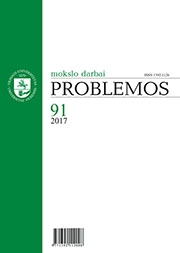KODĖL ARISTOTELIS NESVARSTĖ TUŠČIŲ TERMINŲ PROBLEMOS?
WHY ARISTOTLE LEFT THE PROBLEM OF EMPTY TERMS UNSOLVED?
Author(s): Živilė PabijutaitėSubject(s): Logic, Ancient Philosphy
Published by: Vilniaus Universiteto Leidykla
Keywords: square of opposition; empty terms; existential import;
Summary/Abstract: The article deals with the problem of empty terms in the Aristotelian square of opposition. There has been an attitude prevalent amongst modern logicians that propositions with empty terms pose the problem of undue existential import and, in order to avoid it, the relations of contrariety, subcontrariety and subalternation must be rejected. We present the problem of propositions with empty terms in the form of a paradox: (1) empty terms are an integral part of Aristotelian logic; (2) particular O proposition with an empty term cannot be true (because of existential import); (3) particular O proposition with an empty term is true (because of the relations of the square). After other main possible solutions to the paradox are outlined, it is argued that neither universal nor particular statements had existential import in the traditional Aristotelian logic, therefore, the second premise is rejected. We formulate our theory as a strongly modified version of the traditional interpretation of the square – although endorsing its main thesis that terms in the Aristotelian logic were not “empty” in the modern sense and, as a result, propositions with such terms have to be treated in the exact same way others are, we do not understand “is” as existential in any sense and suspend any talk about existence in the Aristotelian square. We base our solution on the recent attempts to offer an intensional (as opposed to long-time dominant extensional) interpretation of categorical terms.
Journal: Problemos
- Issue Year: 2017
- Issue No: 91
- Page Range: 141-155
- Page Count: 15
- Language: Lithuanian

